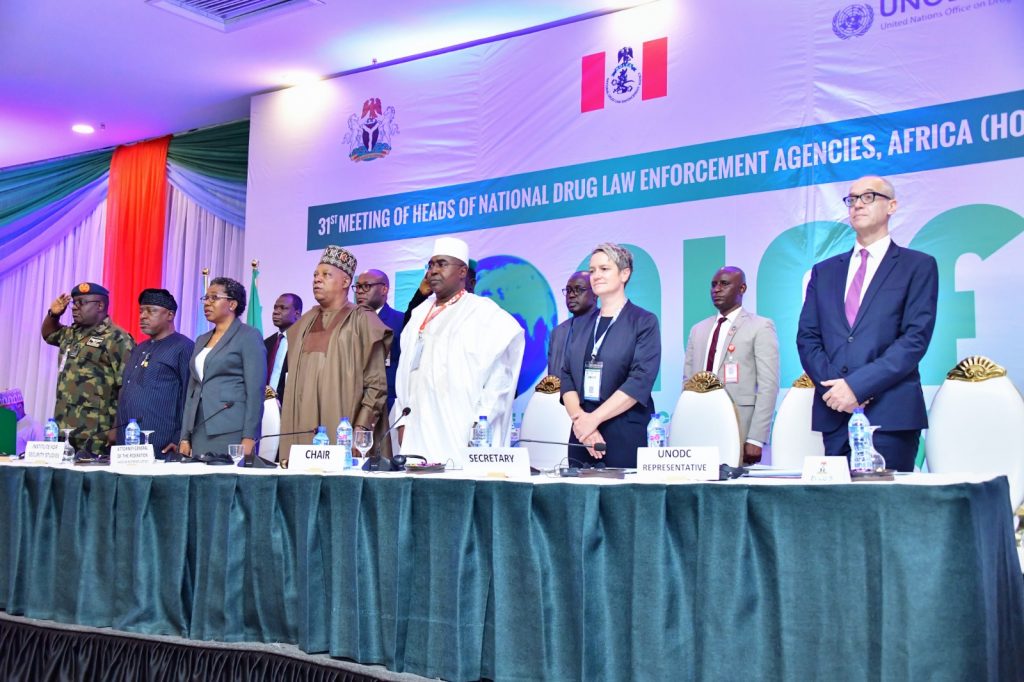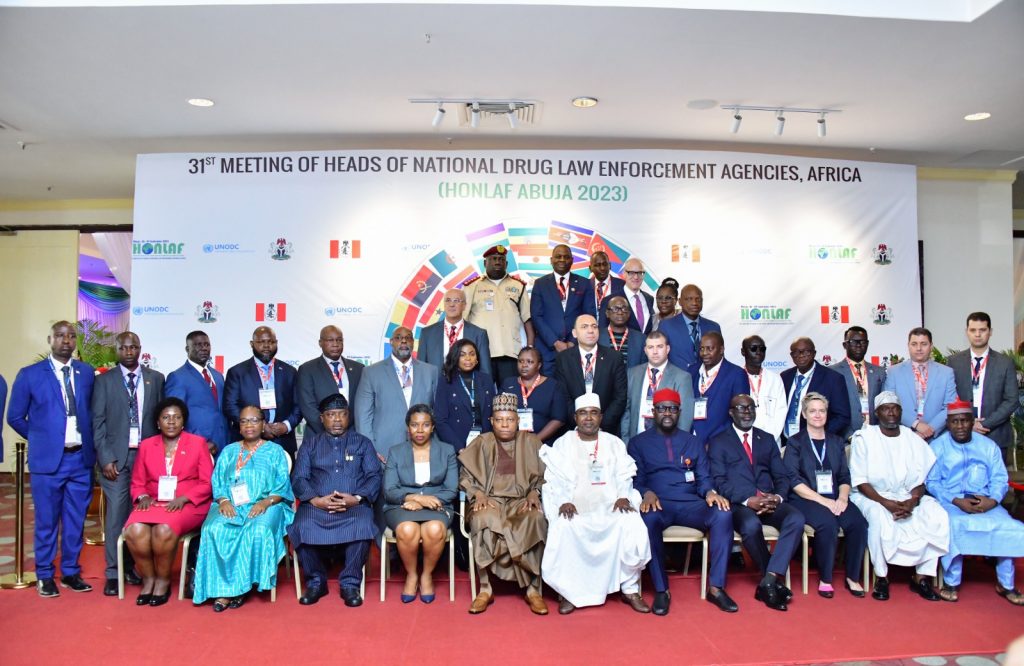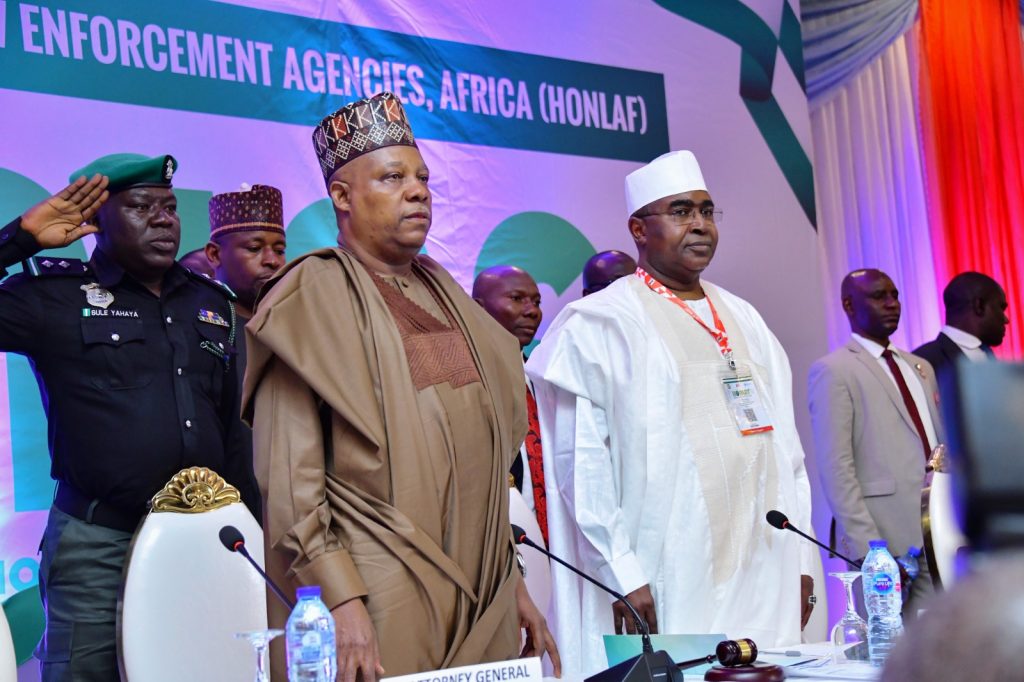Africa Will Remain In Chains If It Fails To Break Drug Enterprises – Tinubu

President Bola Ahmed Tinubu has warned that African will remain in chains till it breaks free from the shackles of the criminal enterprises of drug barons and syndicates of illicit drugs.
He gave the warning in Abuja on Tuesday when he declared open the 31st meeting of the Heads of National Drug Law Enforcement Agencies, Africa (HONLAF) at the Abuja Continental Hotel.

The president, who was represented by Vice President Kashim Shettima, implored heads of national drug law enforcement agencies in Africa to renew the fight against substance abuse and illicit drug trafficking in their respective countries.
“If we don’t dismantle the criminal enterprises that threaten our future and build a brighter tomorrow for all Africans, we will remain in chains in a diseased and amoral world, as will our children and their children,” he told the anti-narcotics agencies’ chiefs.

In his keynote address titled, ‘Rising Above the Drug Threat’, President Tinubu observed that Africa was “at the mercy of a threat that knows neither race nor geography, neither gender nor social class”.
To this effect, he enjoined the heads of drug law enforcement agencies to consider the conference in Abuja as a ray of hope and a catalyst for positive change across the continent.
The president, in a statement by presidential spokeman, Stanley Nkwocha, thanked them for their sacrifices in ensuring a world that is free of illicit drugs.
He said, “This threat has crossed borders and destroyed societies and dreams. Without the moral commitment of the men and women in this room, this threat would have left cities, countries, and even civilizations erased. So, I must commend you for your sacrifices in the bids to keep our world drug-free, sane and safe.

“This conference emphasizes your investment across borders to protect us from the devastations of drugs, a threat that only submits to the enforcement of the law.
“Therefore, we are grateful to HONLAF and its partners, notably the United Nations Office on Drugs and Crime, for creating this avenue, for offering intelligence and drug law enforcement officials a grand opportunity to compare notes, collaborate, and build networks that would be several steps ahead of the criminal network of drug transnational organizations.”
Tinubu noted that in the last couple of decades, criminal organisations had made frantic efforts to breach the security measures in African countries in a bid to pollute the minds of their citizens, adding that the anti-narcotics agencies had proven to be a thorn in their flesh.
The president who doubles as the chairman of the Authority of Heads of State and Government of the Economic Community of West African States (ECOWAS) stated: “But while it’s a compliment that drug-law enforcement organizations are a threat to their criminal empires, their desperation must never be taken for granted.
“Without you as gatekeepers of healthy nations, humanity as we know it would have long been perverted. So, on behalf of the world, I say: thank you, thank you to all of you who have kept us from being polluted and destroyed.
“For us, the commitment to the fight against drug trafficking and substance abuse is not just a matter of policy; it is a moral imperative. We recognize that a population at war with drugs is not a dividend but a liability. We believe that the future of our youth, the strength of our institutions, and the well-being of our communities depend on our ability to eradicate this threat.”
President Tinubu further stressed the need for the the anti-narcotics agencies to consolidate established contacts, strengthen operational existing partnerships and cooperation among them at the sub-regional and regional levels.
This, he said, would make trafficking of illicit drugs and movement of drug syndicates difficult in the African continent.
He continued: “So, I must appeal to you to see this gathering as an avenue for the exchange of novel ideas and the development of practical strategies. We must consolidate established contacts, operational partnerships, and cooperation to ensure that the outcomes of this four-day deliberation advance public safety and the emergence of drug-free African communities.
“Our strength has always been our proactive actions to prevent any individual or group from turning our countries into a minefield of drug trafficking. So, we must prioritize prevention, education, and rehabilitation to empower our youth with knowledge and opportunities. We must steer them away from the treacherous path of drug abuse and trafficking and protect our economy from the consequences of their actions.
“This administration will continue to provide the necessary support, motivation, and tools for the NDLEA to fulfill its mandate. We understand the connection between the success of the fight against substance abuse and illicit drug trafficking and the attainment of a number of goals on our socioeconomic and security agenda.
“Ladies and gentlemen, I know you don’t need to be reminded of the sacred task before us. I know you are fully aware of the number of people and dreams that depend on your decisions and actions to reach their destination. But, more importantly, I know that you are up to the task.”
On the choice of Nigeria for the conference, President Tinubu said it is a profound recognition of the campaign and fight against illicit drugs in the country by the National Drug Law Enforcement Agency (NDLEA).
Read Also: APC Youth Leader Begs Atiku Abubakar To End Case Against Tinubu In US Court
Welcoming guests earlier, Chairman of the NDLEA, Brig. Gen. Buba Marwa (rtd), restated the stakeholders’ commitment to addressing the world’s drug problem, noting that Nigeria will continue to uphold the objectives of multilateral organizations dedicated to combating drug trafficking and related crimes.
He emphasized the need for global partnerships in addressing drug trafficking and other vices, noting that world’s drug problem cannot be effectively tackled by individual entities.
Speakers at the opening session of the meeting included the Executive Director of the United Nations Office on Drug and Crime (UNODC), Mr Ghada Fathi Waly; the UNODC Country Representative, Mr Oliver Stolpe; The Commandant of the National Institute for Security Studies, Mr Ayodele Adeleke, and Representative of the Attorney General of the Federation and Minister of Justice, Mr Lateef Fagbemi, SAN, among others.

